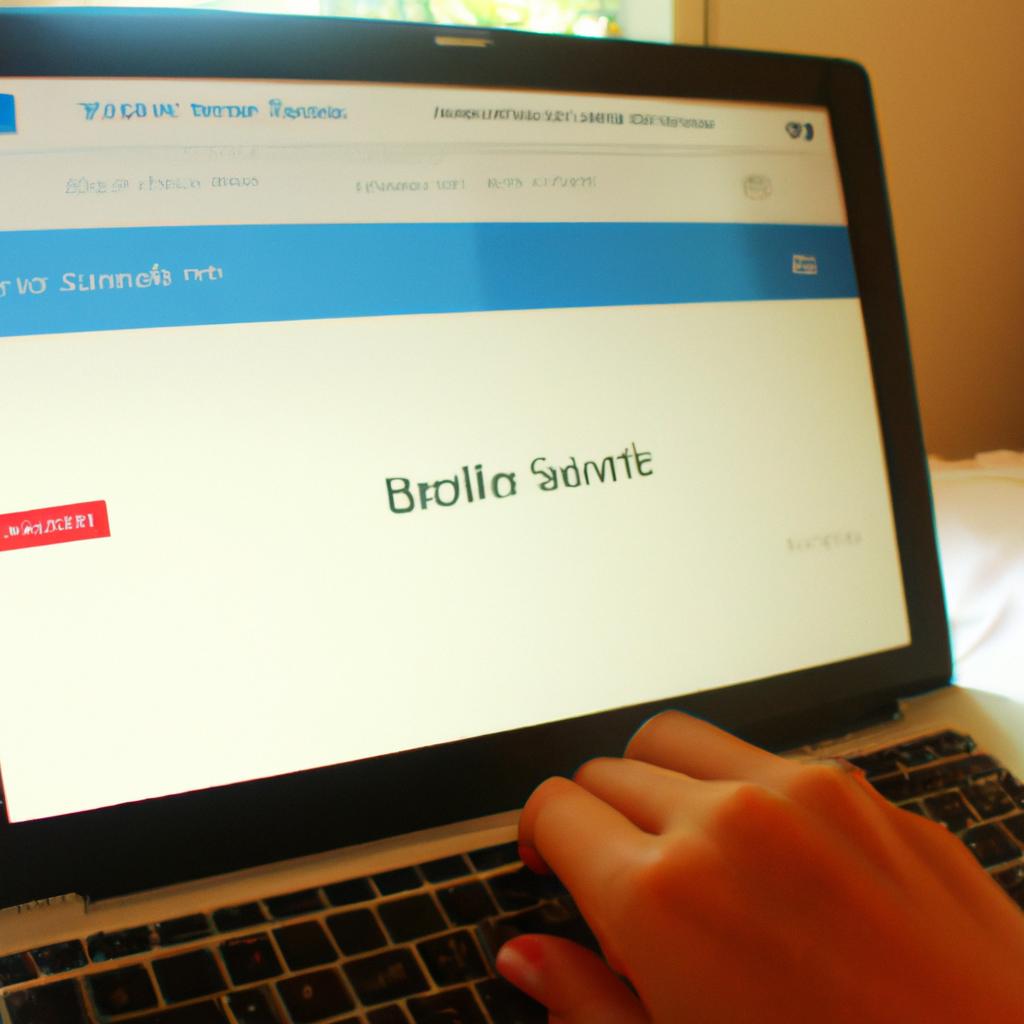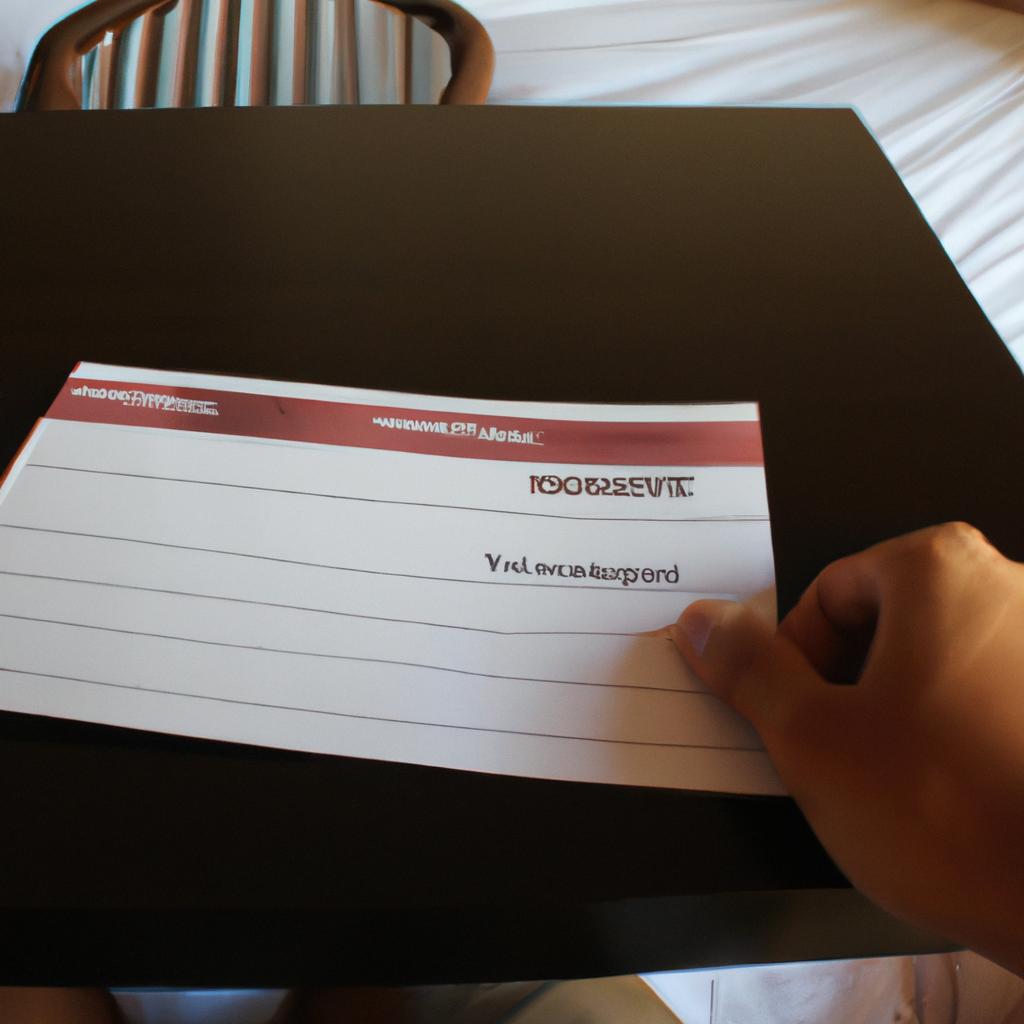The check-in and check-out times of hotel reservations play a crucial role in the overall guest experience and operation management for hotels. Understanding these timings is essential for both guests and hotel staff to ensure smooth transitions between stays and optimize room turnover rates. For instance, imagine a hypothetical scenario where a business traveler arrives at a hotel after an exhausting flight only to find out that their room is not ready until several hours later due to a late check-out by the previous occupant. Such situations can lead to frustration and dissatisfaction among guests, highlighting the significance of efficient check-in and check-out processes.
In this article, we will delve into the insights surrounding check-in and check-out times in the context of hotel reservations. By examining various factors such as industry practices, guest preferences, operational considerations, and technological advancements, we aim to provide valuable knowledge that can aid both hotels and travelers in making informed decisions regarding reservation timings. This analysis will shed light on how different strategies can be employed to enhance customer satisfaction while maintaining optimal efficiency within the hospitality industry. Through exploring case studies and research findings, we seek to present practical recommendations for improving check-in/check-out experiences with an emphasis on enhancing guest convenience without compromising revenue generation or operational effectiveness.
Importance of Check-in and Check-out Times
The check-in and check-out times play a crucial role in the overall guest experience at hotels. These timings determine when guests can arrive to start their stay or depart from the property, and they greatly influence the efficiency and effectiveness of hotel operations. For instance, imagine a scenario where a business traveler arrives early in the morning after an overnight flight, only to find out that they cannot check into their room until later in the afternoon. This inconvenience could potentially impact their productivity for the day and leave them dissatisfied with their stay.
To emphasize the significance of timely check-ins and check-outs, consider these emotional responses:
- Frustration: Picture a family eagerly waiting to begin their vacation but being forced to wait long hours due to delayed check-ins.
- Stress: Imagine a couple attending a wedding ceremony who risk missing important events because of extended time spent checking out.
- Relief: Visualize tired travelers arriving late at night, relieved to find that quick check-in procedures allow them immediate access to rest.
Moreover, efficient management of check-in and check-out processes contributes directly to customer satisfaction rates. A well-executed arrival experience sets the tone for a positive stay while seamless departure procedures ensure guests leave on a high note. To illustrate this further, consider Table 1 below showcasing potential benefits associated with optimized hotel reservation timing:
| Benefits | Description |
|---|---|
| Enhanced Guest Experience | Smoothly executed check-in/out processes contribute significantly towards guest satisfaction |
| Improved Operational Efficiency | Streamlined timings lead to reduced queues & enhanced staff productivity |
| Increased Revenue | Prompt turnover allows hotels to accommodate more bookings leading to better financial performance |
| Positive Online Reviews | Satisfactory experiences encourage guests to write favorable feedback boosting online ratings |
In summary, it is evident that proper attention must be given to establishing appropriate check-in and check-out times at hotels. Failure to do so can result in negative emotional responses from guests, impacting their overall experience and perception of the property. In the subsequent section, we will explore factors that influence these timings, shedding light on key considerations for hoteliers.
Factors Influencing Check-in and Check-out Times
To understand the factors that influence check-in and check-out times, let’s consider a hypothetical scenario. Imagine you have just arrived at a hotel after a long day of traveling. You approach the front desk to check-in, but there is a line of guests waiting before you. As time passes by, you start to wonder what could be causing this delay in the process.
Several aspects can impact check-in and check-out times, including:
-
Occupancy Level: The number of guests currently staying at the hotel directly affects the efficiency of the check-in process. During peak periods or when there are limited staff members available, it may take longer for each guest to complete their registration.
-
Room Availability: If your room is not yet ready upon arrival, additional time will be required for housekeeping to prepare it. Similarly, during busy periods when many guests are checking out simultaneously, delays can occur as rooms need to be cleaned and inspected before being assigned to new arrivals.
-
Guest Needs and Requests: Special requests made by guests, such as specific room locations or extra amenities like cribs or rollaway beds, can contribute to lengthier check-in processes if these requirements cannot be immediately accommodated.
-
Technology Issues: While technology has streamlined various hotel operations, technical glitches with key card systems or computer networks can cause delays during both check-in and check-out procedures.
- Frustration arising from extended wait times
- Anxiety about missing planned activities due to delayed check-ins
- Disappointment caused by unmet expectations regarding room availability
- Impatience resulting from unresolved issues or complications during the process
Now let’s visualize some key factors influencing check-in and check-out times using a table:
| Factors | Impact on Process |
|---|---|
| Occupancy Level | Longer waits during peak periods or limited staff |
| Room Availability | Delays if rooms are not ready or need cleaning |
| Guest Needs and Requests | More time required to accommodate special requests |
| Technology Issues | Potential delays due to technical glitches |
Considering these factors, it becomes evident that the smooth functioning of check-in and check-out processes relies on a well-managed combination of staffing levels, room preparation, guest communication, and robust technology systems.
In the subsequent section about “Tips for Optimizing Check-in and Check-out Processes,” we will explore strategies that hotels can employ to enhance efficiency in these areas.
Tips for Optimizing Check-in and Check-out Processes
Factors Influencing Check-in and Check-out Times:
Consider a situation where a family of four arrives at a hotel after a long journey. They are tired, eager to settle in their room, and start enjoying their vacation. However, upon reaching the reception desk, they find themselves waiting for an extended period before being able to check-in. This scenario highlights the importance of understanding the factors that influence check-in and check-out times in hotels.
Several key aspects contribute to the duration of these processes:
-
Guest Arrival Time: The time when guests arrive plays a significant role in determining how quickly they can access their rooms. During peak periods or high occupancy seasons, such as holidays or weekends, there is typically a higher demand for rooms. Consequently, this may lead to longer wait times due to increased processing requirements.
-
Hotel Staff Efficiency: The efficiency and effectiveness of hotel staff also play a crucial role in expediting the check-in and check-out processes. Well-trained personnel who possess excellent customer service skills can significantly reduce waiting times by efficiently handling guest requests and managing any unforeseen challenges that may arise during these procedures.
-
Reservation System Accuracy: Accurate reservation systems are essential for ensuring smooth transitions during check-ins and check-outs. A reliable system enables seamless coordination between various departments within the hotel, allowing them to prepare rooms promptly while minimizing errors or discrepancies that could cause delays.
The emotional toll caused by prolonged wait times cannot be overlooked; it can result in frustration, impatience, and even dissatisfaction with the overall stay experience.
- Waiting for an extensive period leads to feelings of restlessness.
- Guests may become increasingly impatient if they perceive disorganization or inefficiency from hotel staff.
- Long queues or crowded lobbies can create discomfort among guests.
- Delays during both check-in and check-out processes may require guests to rearrange their travel plans, causing inconvenience and potential dissatisfaction.
Understanding these factors is crucial for both hotel management and guests. By recognizing the elements that impact check-in and check-out times, hotels can implement measures to enhance efficiency and minimize wait times, thus improving guest satisfaction.
In the subsequent section, we will delve into a discussion about understanding early check-in and late check-out policies. This information will allow guests to make informed decisions regarding their arrivals and departures while optimizing their overall stay experience at a hotel.
Understanding Early Check-in and Late Check-out Policies
Building on the previous discussion regarding optimizing check-in and check-out processes, it is essential to understand the policies surrounding early check-ins and late check-outs. By familiarizing ourselves with these policies, we can better manage our hotel reservations and ensure a smooth experience during our stay.
To illustrate this further, let’s consider an example: imagine you have booked a room at a popular beachfront resort for a weekend getaway. You plan to arrive early in the morning but are unsure if you can access your room immediately upon arrival. Similarly, you want to make the most of your last day but would prefer not to be rushed out before noon. This is where understanding early check-in and late check-out policies becomes crucial.
Several factors influence these policies, including hotel occupancy rates, housekeeping schedules, and guest preferences. Hotels often aim to accommodate guests by offering flexible options whenever possible. However, due to logistical constraints, such as limited staff or high demand periods, certain restrictions may apply.
Here are some key points to keep in mind when considering early check-ins and late check-outs:
- Availability: While hotels strive to fulfill requests for early arrivals or extended stays, it ultimately depends on the availability of rooms.
- Fees: In some cases, additional fees might be applicable for accessing rooms earlier than standard check-in times or extending stays past regular checkout hours.
- Prior notice: To improve chances of securing an early check-in or late check-out, it is advisable to notify the hotel in advance about your requirements.
- Membership benefits: Certain loyalty programs or membership levels may offer perks like guaranteed early check-ins or late check-outs as part of their benefits package.
Considerations when dealing with early check-ins and late check-outs:
- Anticipation – eagerly awaiting access to your accommodation
- Convenience – having flexibility in planning activities around your arrival/departure times
- Peace of mind – knowing that your request has been accommodated or understanding any limitations beforehand
- Cost-effectiveness – balancing the desire for extra time against potential additional fees
Emotional table:
| Consideration | Early Check-in | Late Check-out |
|---|---|---|
| Anticipation | Excitement upon immediate room availability | Extended relaxation before departure |
| Convenience | More time to settle in and freshen up | Extra hours for leisure activities |
| Peace of mind | Avoiding uncertainty and waiting times at reception desk | Less rush and stress during check-out process |
| Cost-effectiveness | May incur additional charges, depending on hotel policy and availability | Potential cost savings by maximizing stay duration |
Understanding early check-in and late check-out policies is not only beneficial for planning our trips effectively but also helps us avoid complications arising from missed timings. In the subsequent section, we will delve into the implications one might face when failing to adhere to these specific check-in and check-out times. By being aware of these consequences, we can make informed decisions regarding our travel arrangements.
With this understanding in place, let’s explore the implications of missed check-in or check-out times and how they can impact our overall experience during a hotel stay.
Implications of Missed Check-in or Check-out Times
As explored in the previous section, early check-in and late check-out policies play a crucial role in hotel reservations. To further illustrate the importance of adhering to these policies, let’s consider an example scenario:
Imagine a traveler named Sarah who has just arrived at her destination after a long flight. She is eager to settle into her hotel room and rest before starting her planned activities. However, upon reaching the hotel, she discovers that her room is not yet ready for check-in due to arriving earlier than the designated time. Frustrated by this inconvenience, Sarah must now find ways to occupy herself until she can access her room.
This example highlights the challenges faced by guests when they arrive too early for check-in. Hotels enforce specific check-in times to ensure smooth operations and sufficient time for cleaning and preparation between guest stays. While some hotels may have limited flexibility regarding early check-ins due to high occupancy or operational constraints, others offer options such as storing luggage or providing access to amenities while guests wait for their rooms.
To better understand the implications of missed check-in or check-out times, let us examine four key points:
- Inconvenience: Guests who miss their scheduled check-in or check-out times may experience considerable inconvenience. They might be left waiting in common areas until their rooms are ready or pressured to vacate their accommodations hastily.
- Financial consequences: Some hotels impose penalties on guests who fail to adhere to specified check-in or check-out times. These penalties often come in the form of additional charges or reduced refunds if guests leave later than expected.
- Operational disruptions: When guests do not abide by established timings, it can disrupt hotel operations. Housekeeping schedules may need adjustment, leading to delays in preparing rooms for incoming guests.
- Reputation impact: A consistent pattern of missed check-in or check-out times can negatively affect a hotel’s reputation. Unhappy guests may leave negative reviews, potentially deterring future bookings.
| Implications of Missed Check-in or Check-out Times |
|---|
| Inconvenience for guests |
| Financial penalties |
| Operational disruptions |
| Potential impact on hotel’s reputation |
In summary, understanding early check-in and late check-out policies is essential for both hotels and guests alike. By respecting these policies, travelers can avoid inconvenience and financial consequences while helping to maintain smooth operations at hotels. In the following section, we will explore industry trends in check-in and check-out times.
[Transition:] Having discussed the implications of missed timings, let us now delve into the fascinating world of industry trends in check-in and check-out times.Industry Trends in Check-in and Check-out Times
Having discussed the potential consequences of missed check-in or check-out times, it is important to examine the broader industry trends that influence these timings. By understanding such patterns, both hotel guests and operators can make informed decisions regarding their reservations.
Example Scenario: Consider a hypothetical situation where a traveler arrives at a hotel after missing the designated check-in time. In this case, not only may they encounter difficulties in obtaining their room key promptly, but they could also face additional charges for late arrival. Conversely, if a guest fails to check out on time, they might be subject to penalties or even lose their reservation altogether.
Industry Trends: Several factors contribute to the evolving landscape of check-in and check-out times across hotels worldwide:
- Customer Preferences: With changing travel habits and increasing flexibility in work schedules, guests often appreciate more flexible arrival and departure options.
- Technological Advancements: The advent of online booking platforms has allowed hotels to streamline their operations by implementing self-check-in kiosks or mobile apps for seamless arrivals and departures.
- Competition among Hotels: To stay competitive in an overcrowded market, some hotels offer extended check-out times as an added perk to attract customers.
- Operational Efficiency: For efficient management of housekeeping services and room turnovers, hotels carefully plan their check-out times based on factors like average cleaning duration per room.
Table: Emotional Response Eliciting Factors
| Factor | Impact |
|---|---|
| Additional Charges | Frustration |
| Penalties | Disappointment |
| Loss of Reservation | Anxiety |
Key Takeaways from Industry Trends:
- Customer preferences play a crucial role in shaping hotel policies related to check-in and check-out times.
- Technological advancements have facilitated smoother arrivals and departures through self-check-in options.
- Competition among hotels drives the provision of extended check-out times as an attractive feature for guests.
- Operational efficiency guides hotels in determining appropriate check-out timings to manage room turnovers effectively.
In summary, missed check-in or check-out times can have significant implications for both hotel guests and operators. Understanding industry trends allows individuals to make informed decisions when it comes to reservations, ensuring a smoother experience overall. By considering customer preferences, leveraging technology, staying competitive, and optimizing operational efficiency, hotels can adapt their policies to meet evolving demands.
 Cedars Inn Auburn
Cedars Inn Auburn



